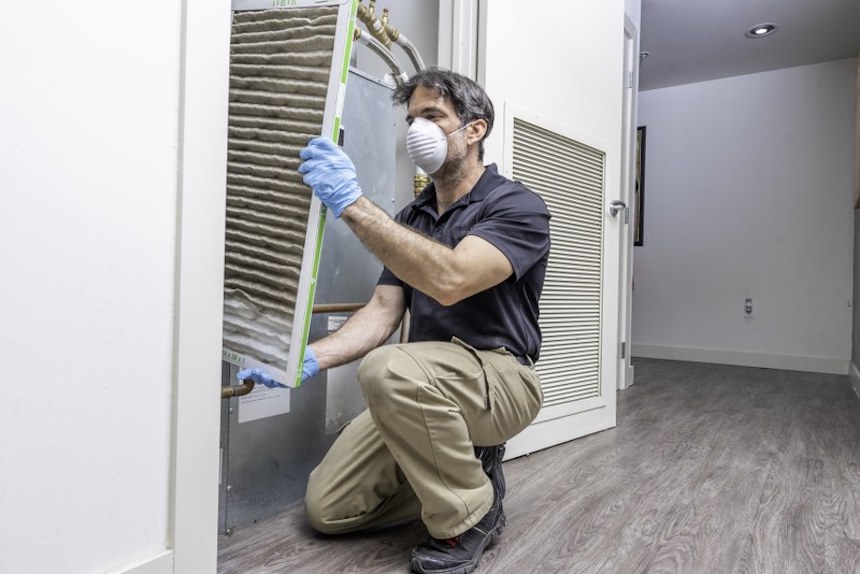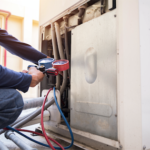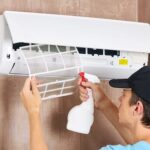
A more traditional ductwork-based HVAC system transports warm or cool air to all the rooms in your home from central units. This is the most common type of HVAC setup. Increasingly, ductless, or mini-split systems are becoming a contender, and are worth considering. Having said that, there are many things that you should consider if you want to install ductless heating and cooling in your home. It’s essential for you to know more about how ductless systems work, the costs, benefits, and potential cons that come with it. Here are the pros and cons of ductless heating and air conditioning.
Pros
Energy Efficiency
The most significant benefit of a ductless system is that it’s much more energy-efficient. In a traditional system, ductwork leaks through the material itself are responsible for significant energy losses, and by eliminating this element of your HVAC system, you can see cooling/heating cost savings of up to 30%. This is mainly because unlike ducts, mini-split systems need only a small hole through the wall that can be easily insulated.
Another reason these systems improve energy efficiency is that you can control the temperature with each unit in each room, so it’s easy to use heat or AC only in the spaces you need it. This is especially helpful for people with larger homes. You can, of course, close off the vents in unused spaces with a forced-air system, but this doesn’t actually save energy and can damage your HVAC system because it creates more pressure in the ducts.
Easy Installation
Ductless systems need only a little space since there’s no in-wall infrastructure to install. Where a traditional system can take weeks to install, a ductless one can be put in as little time as in a day or two. They only require a small hole through exterior walls and no modification or tearing down of existing walls or ceilings. The other upside of this is that with new construction, that’s less square footage lost to HVAC infrastructure.
Air Quality
Ductwork can circulate dust, allergens, and mold spores throughout your home, so it comes with potential health problems and additional maintenance as you’ll have to clean your ducts periodically. To prevent this, you need to undertake regular cleaning that can get expensive and time-consuming. Ductless systems dramatically improve the air quality in your home because there are no ducts to transmit these contaminants. They also typically come with filtration systems to remove such particles from the air coming into your home. You do need to wash these filters regularly, but compared to full duct-system cleaning, it’s easy, and you can do it yourself.
Noise
Ductless systems are so quiet you’ll probably forget they’re running. This can be a nice change from loud ductwork or window units.
Cons
Up-Front Cost
Though they provide more efficient and affordable energy, the up-front expense of a ductless system is significant. You might spend two to three times as much on a whole-house ductless system as you would upgrading a ducted system. That cost is recouped over time through lower energy bills and less money spent on maintenance, but the initial investment is there.
Presentation
Rather than a barely noticeable air vent, with ductless systems, you’ll have a unit installed on the wall. Some people think they’ll be bothered by the visual of this option. However, you can install them relatively high on the wall or in the ceiling, where they’ll be somewhat unobtrusive.
Temperature Limitations
In colder climates, a ductless heating system may not be powerful enough to warm the inside air to the temperature you want. And if you live somewhere frigid with heavy snowfalls in the winter, you’ll have extra work to do keeping the outdoor unit cleaned off so it can function properly.
Regular Cleaning
As mentioned earlier, ductless systems include filters that need to be cleaned monthly to prevent the unit from malfunctioning. This isn’t optional; skipping it will lead to expensive repairs later.
So how to decide? Some situations in which going ductless may be the right choice include:
- A new addition to the house that needs its own heating/cooling
- Reconfiguring heating/cooling in a house where you no longer use all the rooms
- Adding AC to a house without existing ductwork
- In a state that offers energy rebates for new installations (find out if yours does)
- When your carbon footprint is a big priority
- The Pros and Cons of Ductless Heating and Air Conditioning - October 28, 2020
- 8 End-of-Summer Preparations to Make at Home - September 15, 2020
- 6 Important First-Year Milestones to Track Your Baby’s Development - September 10, 2020






